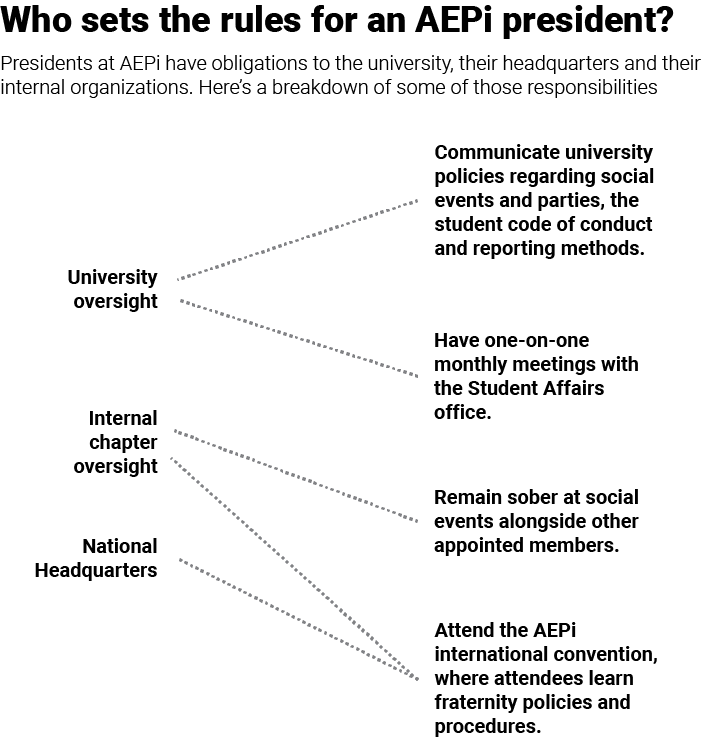
When there are issues in a Greek life organization, the first person the university and international headquarters turn to is the chapter president.
The president of a fraternity or sorority “may be the main point of contact,” if criminal charges are brought against the entire chapter, said Chris Carey, the senior associate dean of students. Otherwise, individuals who are involved in misconduct are held responsible for their own actions.
There are three main institutions that oversee Temple’s fraternity and sorority chapters’ activity and decision-making: the university, which oversees Greek life through the Division of Student Affairs, the chapter’s headquarters and the chapter’s executive board of elected leaders.
As Temple and Philadelphia Police continue to investigate Temple’s chapter of the Alpha Epsilon Pi fraternity, its former president, Ari Goldstein, 21, faces more than a dozen sexual assault-related charges in two separate cases.
Goldstein is the only AEPi member to face criminal charges and is awaiting a preliminary hearing for a second round of sexual assault-related charges on Sept. 27. Two female victims, at least one of them a Temple student, alleged Goldstein sexually assaulted them in separate incidents at the chapter’s house at Broad and Norris streets. He denied that he committed crimes against either of these women, his defense attorney previously told The Temple News.
The chapter remains inactive this semester and the Temple and Philadelphia police’s investigation into credible reports of sexual assault, underage drinking, excessive alcohol use and possible drug use during social activities at the fraternity has yet to reveal whether others in the organization are responsible for wrongdoing.
But what are a president’s responsibilities, and what checks are in place and how are they held accountable?
INTERNAL CHAPTER OVERSIGHT
Most of Temple’s fraternities and sororities select their own executive board members through internal elections, and the board is the first to handle any issues that may arise within the organization.
The Temple News found that in the constitutions of several Greek life chapters on Main Campus, the executive board is the primary governing body which institutes a chapter’s individual rules and regulations.
These students become leaders in their chapters, which can contain two to more than 200 members each. The president, oftentimes, takes on most of the responsibilities for appointing vacant positions and ensuring the safety of the group.
“The president is a leader, and they are the first one people contact when something happens that represents the whole entire organization,” said Alex Tran, former Multicultural Greek Council president at Temple.
Tran graduated in 2017 with an information science and technology degree. He also served as chapter president of Delta Chi Psi, Temple’s Asian-American fraternity.
“I definitely felt like I was a really big face as president [of Delta Chi Psi] when I was active here on campus,” Tran added.

The Temple AEPi chapter’s most recently updated constitution from Spring 2017 states the “Master” — the term used by the international organization to describe the chapter’s highest-ranking executive board member, or president — runs brotherhood meetings, may appoint and remove committees and has the “final say of all chapter policies except those that are voted on under this constitution.”
“All decisions that are not mentioned in this Constitution will be made by the Master,” the Spring 2017 constitution states. “The Master’s decision is final.”
This indicates that the AEPi chapter president has ultimate decision-making power within the organization. While the constitution provides details about the impeachment of executive board members, motions of impeachment are to be submitted to the president himself. If an executive board member is impeached, his interim replacement is appointed by the president.
There is no section in the AEPi chapter constitution that details the procedure when the president is the individual being impeached. There is, however, a Judicial Committee within the chapter that is meant to “rule as an objective court on all cases of misconduct inside of the fraternity.”
It is also the AEPi president’s responsibility, as laid out in the constitution, to act as “chief delegate to the Supreme Council at the National Convention” and “act as chairman of the delegation.” The chapter president also receives funds allocated to the chapter by headquarters.
Jonathan Pierce
Spokesman for AEPi’s headquarters
Other fraternities, like Pi Lambda Phi, which has a chapter at Temple, also delegate this responsibility to their chapter presidents. A president is expected to keep his chapter compliant with “institutional guidelines and regulations.”
Most of the internal decision-making is left to the discretion of the executive board of the AEPi chapter, a recent former president of Temple’s AEPi chapter said under the condition of anonymity to protect his standing as an alumnus of the fraternity.
“Too many times in these organizations, because it’s meant to be a secret organization where we would keep so many things internal, people are afraid to report certain things [to authorities] and I think that’s so wrong,” the former president said. “There has to come a point where life takes over and you say,‘We’re dealing with human beings. We’re dealing with human life.’”
HEADQUARTERS OVERSIGHT
Temple’s sororities and fraternities are typically individual chapters of larger, national or international Greek organizations, like the AEPi fraternity, which has nearly 200 chapters worldwide.
Jonathan Pierce, a spokesman for AEPi’s headquarters, said that the fraternity does “everything [it] possibly can” to teach values and health and safety policies, including risk management, to all of its undergraduate members. As of 2017, new members are required to go through an online training module, he added.
“We would hope that our leaders are our most responsible individuals,” Pierce said. “It doesn’t always happen.”
AEPi headquarters communicates to members through materials sent over email, and it directs members to its mission and health and safety guidelines found on its website. AEPi headquarters hosts regional conclaves, and at least one representative from each chapter is “supposed to be present” at the AEPi international convention hosted each year, Pierce said. Normally, he said, the chapter president attends.
Pierce said that all presidents are expected to communicate with the educational leadership consultant for the Mid-Atlantic region, who educates regional chapters on AEPi headquarters’ policies and procedures.
“All that said, every undergraduate should know what our policies and procedures are,” Pierce said. “They do not have an excuse not to know. We communicate it to them in a number of different ways. Certainly as you get older and as new members and become chapter leaders, I’m pretty sure you’ve seen this.”
The former, anonymous Temple AEPi president said he did not recall communicating directly with a staff member from the international organization.

He was critical of AEPi headquarters’ involvement with the Temple chapter during his presidency. The former president said the international organization only appeared to reach out to the chapter when it owed dues, and was otherwise “very hands-off.”
“If you paid your dues, you were seen as this golden chapter… if you didn’t, you were seen as a bad chapter,” the former president said. “There were some years where we were kicking butt, and we were doing great things out in the community, but a couple of our members struggled to pay their dues and it felt like the [inter]national headquarters wasn’t happy with us.”
“We probably had enough things going on where they should have sent someone our way to check in on us and make sure everything was good, and they didn’t,” the former president added.
Pierce said those claims are “just not true.”
“Our only concern is developing future leaders in the Jewish community,” he added. He also said the headquarters has a tip line for members to anonymously report concerns.
Goldstein’s defense attorney Perry de Marco did not respond to multiple requests for comment about Goldstein’s involvement in AEPi or his training from the international fraternity or university.
The international headquarters of AEPi will not be making any decisions about the fate of the Temple chapter until the investigation into its conduct has concluded and Goldstein is given due process in his own cases, Pierce said.
“We’re still waiting to work with the university and local authorities to determine their findings on how or if this was, in their opinion, what the chapter was involved with versus what this individual has been accused of,” Pierce said.
“Obviously if we’re able to determine if the abhorrent behavior was something that was condoned by the chapter, that others in the chapter were aware of and allowed to continue, those [are the] kinds of things we would look at,” he added.
UNIVERSITY OVERSIGHT
Presidents are responsible for meeting with university Greek life officials in Student Activities to communicate university policies with the rest of their chapters.
The Temple AEPi chapter’s Spring 2017 constitution states that the president acts as a “liaison to all outsiders of the fraternity. (E.g. the university, [headquarters], police, etc.).”
Similarly in its own constitution, the Temple chapter of Pi Lam delegates the “Rex” — Pi Lam’s term for the chapter’s highest-ranking executive board member — as the “main representative for the chapter to the [Interfraternity Council] and to the Office of Greek Life.”

Greek life presidents are required to attend monthly presidents’ roundtables and meet one-on-one with Student Activities throughout the semester. However, over the past year, the office has experienced changes in staff, and Carey said those one-on-one meetings were less frequent.
Presidents also attend a retreat the beginning of each semester, said Mat Greer, the program coordinator for fraternity and sorority life, who was hired by Temple in May.
Greer described the retreat as a “check-in point” following winter and summer breaks for chapter leadership to be updated on university policies and requirements for the organization’s Diamond Accreditation. Presidents are educated on safety, reporting, risk, social events and travel policies and topics from the Student Code of Conduct.
Greek life organizations usually transition into new leadership at the beginning of the fall or spring semesters, and Greer said the retreats often serve as an introduction to the university’s expectations for new chapter presidents. Presidents are then expected to share this information with the rest of the chapter.
The university evaluates whether the president reviewed policies with the rest of their chapter at the chapter’s Diamond Accreditation meeting, which takes place at the end of each academic year. Diamond Accreditation ranks student organizations on a numerical scale of zero to four based on categories like academic achievement and civic involvement.
Greer said when a Greek organization is at One-Diamond status, Student
Affairs will have a “very strong conversation with the national headquarters” about the value of the chapter on campus.
The other tiers, two through four, illustrate that the organization is meeting or excelling expectations.
Student Activities also holds risk management trainings at the beginning of the semester for organizations’ respective risk management and social chairs, Carey said. This training reviews safety issues relating to alcohol and drugs, sexual misconduct and consent, home safety and “good neighbor policies.”
Based on its Spring 2017 constitution, Temple AEPi had two risk chairmen on its executive board who were responsible for sharing the duties of “preparing the chapter in the party risk management procedures” and to “remain sober at all social events/mixers.”
A Former AEPi President
According to the constitution, the president is also required to remain sober “at all house functions that carry risk besides brother only events.”
The affidavit of probable cause for the second round of charges against Goldstein states that he texted the victim the day after the alleged sexual assault occurred.
“I was really blacked out, but that’s not an excuse for what happened,” Goldstein wrote in a text to the victim.
Presidents and risk management chairs are not the only Greek life members responsible for educating new members; representatives from every chapter are also trained. Greer said this training helps “new member educators” within a fraternity or sorority understand what they should communicate to new members.
“All of the things we then go over, we ensure that they are also reflected back to the chapters and it’s not just something that the presidents hear from one person, it is then reflected back to the individual organizations,” Greer said.
The former Temple AEPi president said that during his administration, there was a representative from the university to advise him on internal decisions. He compared the one-on-one meetings with Student Activities to a patient being seen by a therapist.
“It was like I was supposed to go there and kind of let out all of my feelings,” he said. “It didn’t happen that there were ever any takeaways or big results.”



Be the first to comment